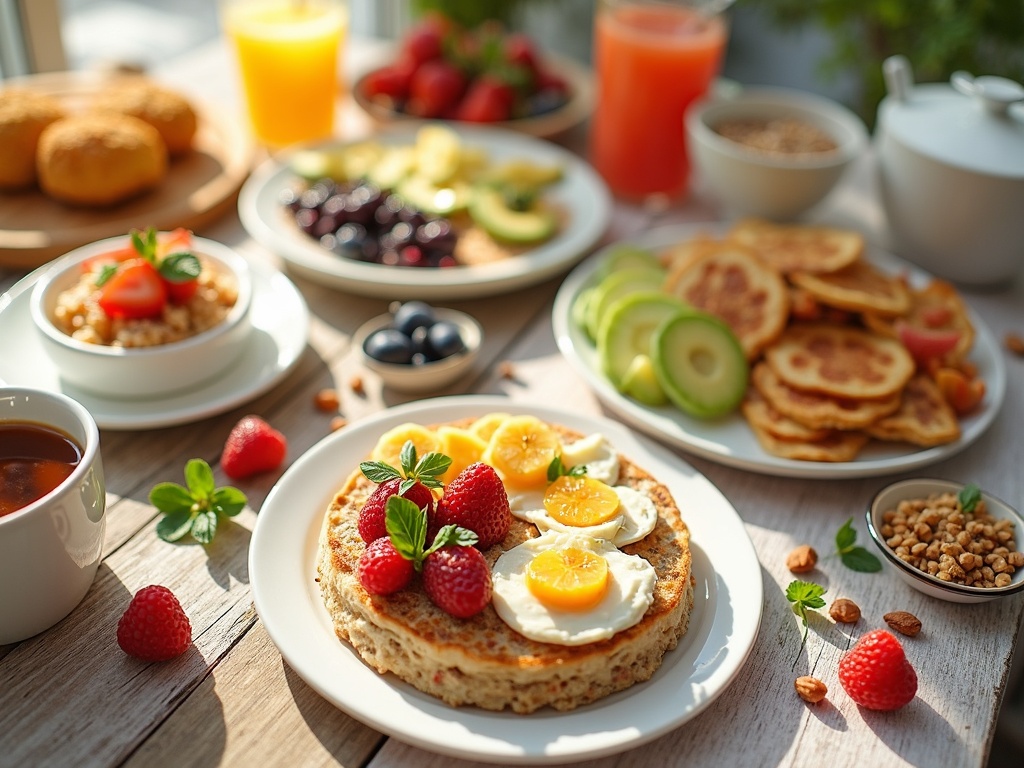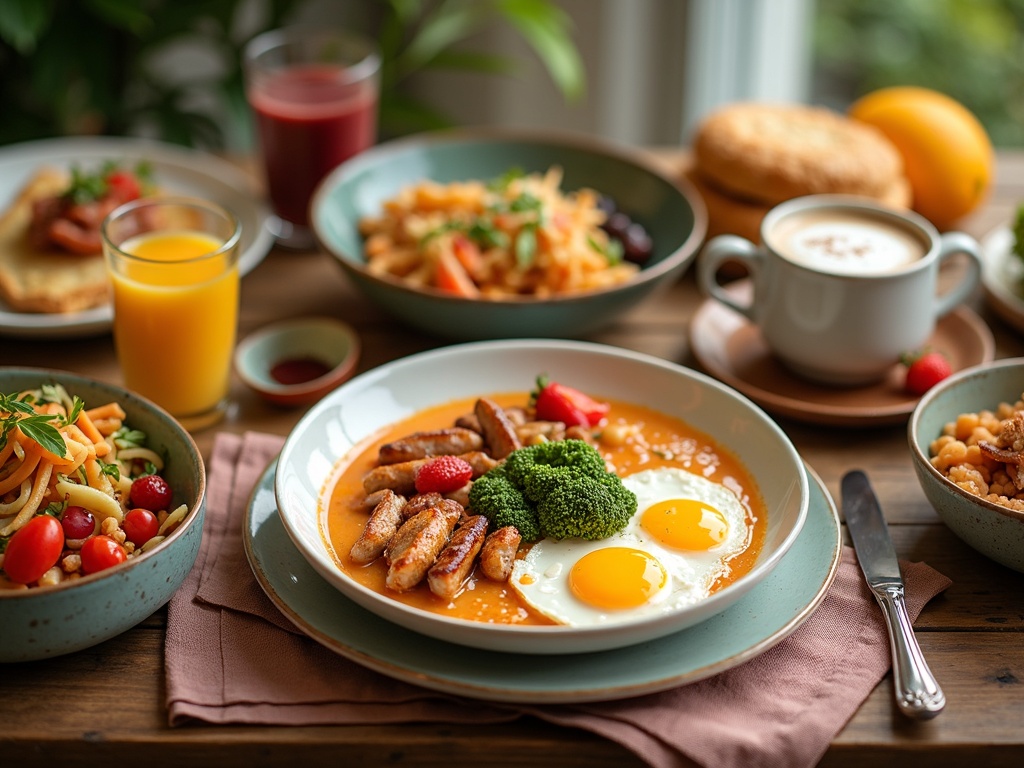Breakfast foods have grown beyond basic staples to include a diverse range of nutritious, globally-inspired options that match changing consumer preferences and lifestyles. From plant-based alternatives and whole grain selections to cultural fusion dishes, today’s breakfast options showcase increased nutrition awareness while balancing quick preparation with health benefits for busy schedules.
Find In This Article
Key Takeaways
- Regular breakfast consumption is associated with a 34% lower risk of obesity and improved cognitive function, yet only 44% of adults eat breakfast daily.
- Cultural traditions heavily influence breakfast choices, from protein-rich Japanese meals with fish and miso soup to hearty English breakfasts and light Italian coffee with pastries.
- Plant-based breakfast options are rapidly growing, projected to reach $1.6 billion by 2025, as consumers increasingly prioritize nutrition without sacrificing taste.
- The ideal breakfast combines complex carbohydrates, proteins, and healthy fats to provide sustained energy and improved focus throughout the morning.
- Generational preferences vary significantly, with millennials driving trends toward plant-based and environmentally sustainable options, while Gen Z embraces global fusion breakfasts.
Why Your Morning Meal Matters Most
I’ve always been passionate about starting my day with a nutritious breakfast. It’s fascinating to see that 93% of Americans consider breakfast the most important meal of the day, yet many still skip it regularly. The disconnect between what we know and what we practice when it comes to morning nutrition deserves a closer look.
Health Benefits Beyond Energy
Regular breakfast consumption offers impressive benefits that extend far beyond just providing morning energy. Studies show that people who eat breakfast consistently have a 34% lower risk of obesity compared to those who skip it. This reduction is significant when considering the growing health concerns related to weight management in modern society.
What’s concerning is that despite understanding its importance, only 44% of adults actually eat breakfast daily—a noticeable drop from 49% in previous years. This declining trend suggests our busy lifestyles might be pushing essential nutrition habits aside.
The morning meal also plays a crucial role in cognitive function. When you eat breakfast, you’re providing your brain with necessary fuel after an overnight fast. This translates to better concentration, improved memory, and enhanced problem-solving abilities throughout the morning. Children who eat breakfast perform better academically, showing higher test scores and better attendance records.
Here are some additional benefits that make breakfast truly indispensable:
- Metabolism activation that helps burn calories more efficiently throughout the day
- Stable blood sugar levels that prevent mid-morning energy crashes
- Reduced cravings for unhealthy snacks before lunch
- Better nutrient intake overall, including essential vitamins and minerals
- Improved mood and reduced irritability
Smart Breakfast Choices
Not all breakfasts are created equal. I’ve found that choosing nutrient-dense options makes a substantial difference in how I feel throughout the day. While a sugary pastry might provide temporary satisfaction, a balanced meal offers sustained energy.
Whole grain options like savory oatmeal provide fiber that keeps you full longer while supplying steady energy. For those with a sweet tooth, French toast made with whole grain bread and topped with fresh fruit offers a delicious yet nutritious alternative to sugar-laden cereals.
Protein-rich breakfasts deserve special attention. They’re particularly effective for maintaining satiety and supporting muscle health. Eggs remain a fantastic staple, but creative options like cloud bread with avocado and seeds can provide similar benefits with exciting flavors.
For busy mornings when time is limited, preparation is key. I’ve saved countless hectic mornings by preparing make-ahead options like overnight oats or breakfast burritos that can be quickly reheated. When hosting guests, breakfast catering can remove preparation stress while ensuring everyone starts their day right.
Cultural breakfast traditions also offer tremendous variety. From light Japanese-style breakfasts to hearty English morning meals, global influences have expanded our breakfast horizons. Fusion options like ube mochi pancakes blend traditional Asian ingredients with Western breakfast formats for exciting morning flavors.
The morning meal sets the tone for your entire day. By prioritizing breakfast, you’re making a conscious choice to fuel your body optimally when it needs it most. Whether you prefer traditional favorites or innovative morning creations, the act of eating breakfast itself might be just as important as what’s on your plate.
Popular Breakfast Foods Around the World
I’ve discovered that breakfast varies dramatically depending on where you are in the world. Each culture brings its own unique flavors and traditions to the first meal of the day, creating a rich tapestry of breakfast experiences worth exploring.
Global Breakfast Traditions
In Japan, breakfast looks quite different from what many Westerners might expect. A traditional Japanese morning meal typically features steamed rice, grilled fish (often salmon), and a warm bowl of miso soup. This protein-rich, savory start provides sustained energy throughout the morning hours. Many Japanese households also include nori (seaweed), pickled vegetables, and natto (fermented soybeans) to round out this nutritious meal.
The English breakfast, often called a “full English,” is legendary for its heartiness. It typically includes fried eggs, sausages, bacon, baked beans, grilled tomatoes, mushrooms, and toast. This substantial meal dates back to the Victorian era when it symbolized prosperity and hospitality. Today, it remains popular in cafes and hotels throughout the United Kingdom, though many Brits save it for weekends rather than daily consumption.
Latin American countries offer some of the most flavorful breakfast options globally. In Venezuela and Colombia, arepas (corn cakes) filled with cheese, meat, or beans provide a portable yet filling morning meal. Meanwhile, countries like Mexico embrace tamales, steamed pockets of corn dough filled with various ingredients and wrapped in corn husks or banana leaves.
Italians take a decidedly different approach to breakfast. A typical Italian morning consists of a strong espresso or cappuccino paired with a simple pastry like a cornetto (similar to a croissant). This quick, light meal reflects the Italian philosophy that the day’s main meals come later. I find this minimalist approach refreshing compared to heavier breakfast traditions.
In the United States, breakfast habits vary widely, though certain foods dominate the landscape. According to consumption data, cereal remains a convenient staple for 24% of American adults. Meanwhile, eggs claim remarkable popularity, with 62% of Americans including them in their breakfast routine. These statistics highlight Americans’ preference for foods that balance convenience with protein.
The global breakfast landscape includes countless other notable traditions:
- Middle Eastern breakfasts often feature flatbreads, hummus, labneh (strained yogurt), and olive oil
- Indian mornings might include idli (steamed rice cakes), dosa (fermented crepes), or paratha (flatbread)
- Australian breakfast culture embraces savory options like avocado toast and Vegemite on bread
I’ve found that breakfast traditions often reflect deeper cultural values around family, work, and time. In countries where breakfast gatherings are common, like Mexico’s extended family breakfasts or the leisurely weekend brunches popular in American culture, the meal becomes as much about connection as nourishment.
For those looking to expand their morning repertoire, trying international breakfast foods offers a delicious cultural education. Starting with simple options like French toast (which actually predates France) or experimenting with ube mochi pancakes from Filipino cuisine can transform an ordinary morning into something special.
The beauty of today’s interconnected world means we can enjoy Japanese rice bowls on Monday, cloud bread on Tuesday, and Mexican chilaquiles on Wednesday without leaving our kitchens. This cultural exchange has enriched breakfast tables worldwide, creating fusion dishes that honor tradition while embracing innovation.

The Rise of Healthy Breakfast Choices
I’ve noticed a major shift in the breakfast landscape over the past few years. Consumers are increasingly prioritizing nutrition without sacrificing taste, creating exciting new opportunities for morning meals.
Health-Conscious Morning Options
A remarkable 71% of consumers now choose whole grain options for their first meal of the day. This isn’t surprising when you consider the digestive benefits and sustained energy these foods provide compared to refined alternatives. The morning grain revolution extends beyond traditional oatmeal to include interesting options like quinoa breakfast bowls, barley porridge, and savory oatmeal variations.
The plant-based breakfast market is expanding at an incredible pace, projected to reach $1.6 billion by 2025. This growth reflects changing attitudes about animal products and increased awareness of environmental impacts. Plant-based alternatives now include:
- Egg substitutes made from mung beans or chickpeas
- Dairy-free yogurts crafted from coconut, almond, or oat bases
- Pancake variations using alternative flours and starches
- Protein-rich tofu scrambles seasoned with nutritional yeast
Avocado toast has transformed from a millennial cliché to a legitimate breakfast staple, appearing on menus from neighborhood cafes to breakfast catering services. Its popularity stems from the perfect combination of healthy fats, versatility, and Instagram-worthy presentation possibilities.
The organic breakfast sector continues growing as consumers seek cleaner ingredient lists. This includes everything from organic eggs and halal turkey bacon to chemical-free granolas and preservative-free French toast breads.
Creative alternatives like cloud bread offer lower-carb options for those monitoring their intake while still satisfying the desire for traditional breakfast textures.
What’s particularly exciting about this health-focused revolution is that it doesn’t require sacrificing flavor or satisfaction. Today’s breakfast innovations prove that nutritious choices can be both delicious and fulfilling, setting a positive tone for the rest of the day.

Power-Packed Nutrients Your Body Needs
Starting my day with a nutritious breakfast gives me the energy I need and sets a positive tone for healthy eating throughout the day. I’ve discovered that focusing on specific nutrients in the morning makes a huge difference in how I feel.
Essential Morning Nutrients
Whole grains are breakfast superstars because they’re packed with fiber that helps with digestion and keeps me feeling full longer. I aim to include foods like oatmeal, whole grain toast, or mochi pancakes that provide lasting energy without the mid-morning crash. Health experts recommend adults consume 25-30 grams of fiber daily, and getting a good portion at breakfast makes reaching that goal much easier.
Protein is another breakfast must-have, and eggs are one of the most complete sources. They deliver high-quality protein along with choline, a nutrient that supports brain function and memory. I’ve found that adding eggs to my morning routine improves my focus and concentration. For plant-based options, savory oatmeal with nuts and seeds can provide similar benefits.
Healthy fats shouldn’t be overlooked either. Avocados, nuts, and seeds contribute to brain health and help with the absorption of fat-soluble vitamins. A slice of French toast topped with berries and a sprinkle of chia seeds creates a perfect balance of carbs, protein, and fats.
Research shows that people who eat a balanced breakfast tend to have better overall dietary quality throughout the day. I’ve noticed I make better food choices when I start with nutrient-dense options in the morning. Even busy mornings can accommodate nutrition with quick options like cloud bread topped with nut butter and banana.
For families or offices looking to fuel their day right, breakfast catering options that focus on whole foods can ensure everyone gets these essential nutrients.
The combination of complex carbohydrates, proteins, and healthy fats creates a nutritional powerhouse that fuels both body and mind. I’ve learned that breakfast isn’t just about filling my stomach—it’s about providing my body with the right building blocks for energy, focus, and health throughout the day.
What Different Generations Are Eating
The breakfast landscape is changing dramatically as different generations bring their unique preferences to the morning table. I’ve noticed how food traditions evolve alongside generational shifts, creating distinct patterns in what people reach for first thing in the morning.
Millennial-Driven Breakfast Revolution
Millennials have become the driving force behind many of today’s breakfast trends, particularly the surge in plant-based options. They’re increasingly choosing dairy alternatives like oat milk in their coffee and plant-based proteins in their morning meals. This generation has embraced avocado toast not just as a meme but as a legitimate breakfast staple combining healthy fats with complex carbohydrates.
The plant-forward trend extends to creative options like savory oatmeal preparations and vegetable-packed breakfast bowls. Millennials tend to seek options that are:
- Environmentally sustainable (reduced carbon footprint foods)
- Photo-worthy for social sharing
- Nutrient-dense rather than simply filling
- Customizable to dietary preferences like vegan or gluten-free
This contrasts with Baby Boomers who typically maintain more traditional breakfast habits centered around eggs, toast, and breakfast meats. Generation Z, meanwhile, shows interest in global fusion breakfasts and experimental options like ube mochi pancakes that blend cultural influences.
Regional and Lifestyle Influences
Breakfast preferences show fascinating regional variations across demographic groups. Southern states maintain stronger traditions of hearty, hot breakfasts regardless of age, while coastal urban areas show higher adoption of breakfast alternatives like intermittent fasting or protein smoothies.
Work schedules dramatically impact how different generations approach breakfast. Remote workers tend to prepare more elaborate breakfasts at home, while commuters gravitate toward portable options. The traditional sit-down breakfast has evolved into something that fits modern life constraints.
Many younger professionals have adapted to grab-and-go concepts like cloud bread breakfast sandwiches or overnight oats prepared in advance. The morning rush doesn’t allow for the lengthy breakfast preparation many grew up with, creating a market for convenient alternatives that don’t sacrifice nutrition.
Income levels create another significant dividing line in breakfast habits. Higher-income households across generations are more likely to patronize breakfast catering services or premium breakfast offerings, while budget-conscious consumers of all ages seek value-oriented options.
The generational divide becomes particularly evident in weekend breakfast behaviors. While older generations maintain traditions like Sunday family breakfasts, younger consumers often view weekend brunches as social events rather than family gatherings. The popularity of French toast and other indulgent breakfast items peaks during these weekend social occasions.
Technology has reshaped breakfast habits across all generations, though adoption rates vary. Younger consumers rely heavily on food delivery apps and online ordering for breakfast, while older generations typically prefer preparing breakfast at home or visiting familiar establishments.
Health consciousness crosses generational lines but manifests differently. Boomers focus on heart-healthy options like oatmeal and whole grains, Gen X balances convenience with nutrition, millennials seek functional ingredients with specific benefits, and Gen Z gravitates toward novel health foods with cultural significance.
The breakfast table has become a fascinating reflection of our changing society – where tradition meets innovation, convenience confronts quality, and generational preferences create a diverse morning food landscape that continues to evolve with each passing year.

Modern Breakfast Innovation
The morning meal landscape has transformed dramatically in recent years. I’ve noticed incredible shifts in what fills plates across breakfast tables, with innovation driving exciting new flavors and healthier alternatives. The traditional bacon and eggs have made room for creative newcomers that satisfy both nutrition-conscious eaters and adventurous foodies alike.
Plant-Forward Morning Revolution
Plant-based proteins have revolutionized breakfast options, particularly in the pancake department. The rise of chickpea flour, pea protein, and hemp seed-infused batters has created pancakes that deliver impressive protein content without animal products. These alternatives often pack more fiber than their traditional counterparts while maintaining the fluffy texture we crave.
Avocado has transformed from occasional toast topper to breakfast superstar. Beyond the classic avocado toast, I’ve seen the emergence of avocado-based spreads that blend this nutrient-dense fruit with herbs, spices, and even fermented ingredients for probiotic benefits. These spreads work brilliantly on everything from French toast to breakfast sandwiches, adding creamy texture and healthy fats to start the day.
The smoothie bowl phenomenon represents perhaps the most Instagram-friendly breakfast innovation. These vibrant creations have evolved from simple blended fruit to complex compositions featuring:
- Superfoods like spirulina, maca powder, and acai
- Texture contrasts from granola, seeds, and dried fruits
- Artistic presentations that elevate the eating experience
- Protein boosts from plant-based powders and nut butters
Breakfast fusion foods have also gained significant traction. I’ve tasted ube mochi pancakes that blend Filipino and Japanese influences, breakfast tacos merging Mexican and American flavors, and congee bowls with Western toppings. These cross-cultural creations reflect our increasingly connected world of food.
Global Influences Reshaping Morning Meals
Globalization has fundamentally changed how we approach breakfast. Traditional cultural barriers have dissolved as social media and international travel expose us to diverse morning rituals. This cross-pollination has introduced American consumers to dishes like shakshuka from the Middle East, congee from Asia, and various grain porridges from across Africa.
The traditional American breakfast has expanded to embrace these global influences. I’ve observed savory oatmeal preparations drawing inspiration from Asian rice porridges, with toppings like soy sauce, scallions, and soft-boiled eggs replacing the typical brown sugar and fruit. Mexican-inspired breakfast burritos have become as commonplace as pancakes in many regions.
Health considerations drive many modern breakfast innovations. The recognition that traditional Western breakfasts often feature excessive sugar and refined carbohydrates has spurred alternatives like cloud bread and other low-carb options. The emphasis on protein-rich morning meals has transformed breakfast menus to feature more eggs, legumes, and alternative proteins.
The breakfast catering industry has also embraced these innovations, moving beyond platters of pastries to offer diverse, customizable morning meal experiences. Corporate breakfast events now frequently feature build-your-own grain bowl stations, international breakfast buffets, and plant-based protein options to satisfy diverse dietary preferences.
Food technology continues to drive breakfast innovation, with plant-based eggs made from mung beans, lab-grown meat alternatives, and 3D-printed food structures all making their way to morning tables. These technological advancements address both sustainability concerns and the desire for novel eating experiences.
The modern breakfast table reflects our evolving relationship with food—embracing health consciousness, cultural exploration, and technological advancement while still honoring the importance of starting the day with a satisfying meal. These innovations suggest breakfast will continue evolving in exciting directions, maintaining its status as perhaps the most dynamic and personal meal of the day.
Sources:
American Journal of Clinical Nutrition – Breakfast and Its Contribution to Nutritional Status
Mintel – Global Breakfast Trends
NPD Group – Consumer Breakfast Trends: Insights from the NPD Group
Statista – Health Trends in Breakfast Choices
Food and Agriculture Organization (FAO) – The Importance of Breakfast: An Overview

